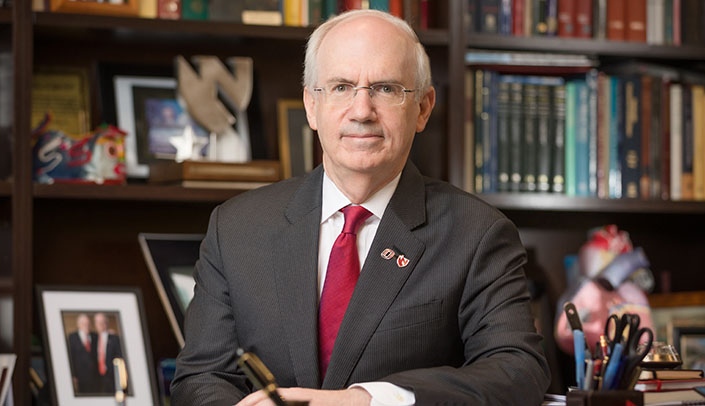On Wednesday, July 8, Chancellor Jeffrey P. Gold, MD, sent the following message to UNMC faculty, staff and students.
To the students, faculty and staff of UNMC:
As you are aware, the COVID-19 pandemic has created significant fiscal challenges for the University of Nebraska system. Work is ongoing to address those challenges at UNMC.
Significant progress on finalizing the 2020-2021 budget will take place over the month of July. Many college, unit, department and individual meetings will take place to communicate progress on the budget and to answer questions that faculty, staff and students may have. We are committed to communicating frequently, university-wide, on our budget process and progress. This will include a campus forum on July 22, and several direct messages from myself and others.
The fact remains that difficult decisions will have to be made. They will be made as efficiently and thoughtfully as possible, with the collective best interests of our academic mission in mind. We will make cuts to academic programs and to staff only after we thoroughly analyze other options. Campus leaders are currently exploring efficiencies in our support services shared between our campus and UNO, as well as across units on each campus.
UNMC vice chancellors, deans and center directors will continue to meet with their colleges and units over the next several weeks. We will continue to communicate frequently on the steps that are being taken university-wide in relation to the budget.
UNMC’s 2.9% net reduction over the next three years in total budget will have an impact of a little more than $6.5 million, with an additional impact of $1.0 million seen on our auxiliary functions, such as parking. This budget reduction is based on several assumptions, including a 2.75% tuition increase for this coming academic year (2020-21) and differential tuition increases.
We will have a bias toward front-loading our budget reductions as much as possible, knowing that a dollar saved today relieves the pressure on dollars that must be saved tomorrow. But we also will continue to look at this challenge with a “growth mindset.” Already, we have seen tremendous growth in student applications from Nebraska Promise and other enrollment incentive programs; our research enterprise is on pace for another record-setting year of extramural support; and the teamwork between campuses and units continues to be inspiring.
We have been fortunate in that some of the more extreme projections that we had modeled as recently as a few weeks ago did not become a reality. In Nebraska, and at UNMC, we are in a better position than many other parts of the country, which have taken massive cuts to their economies because of the pandemic and the associated economic downturn. I also strongly believe that our growth strategy is highly viable and sustainable.
Still, there is no denying that difficult choices will have to be made. These budget changes will affect personnel, both current employees and in the loss of unfilled positions. We will do everything we can to protect our talented faculty and staff. Some of the budget-reducing programs that the university has introduced — including a voluntary FTE-reduction program and a new furlough policy — will provide some assistance in reaching our budgetary goals.
Your feedback and input, particularly on new growth opportunities, are essential to helping us understand the needs of our campus community. I look forward to working with the entire UNMC community as we move through these changes. Please send any questions or input that you have to unmcpr@unmc.edu.
Thank you,
Jeffrey P. Gold, MD
Chancellor
University of Nebraska Medical Center
University of Nebraska at Omaha
